William Flynn Martin
| William Flynn Martin | |
|---|---|
 | |
| Special Assistant to President Reagan National Security Council | |
|
In office 1983–1985 | |
| President | Ronald Reagan |
| Executive Secretary National Security Council | |
|
In office 1985–1986 | |
| President | Ronald Reagan |
| U.S. Deputy Secretary of Energy | |
|
In office 1986–1988 | |
| President | Ronald Reagan |
| Executive Director 1992 Republican Platform Committee | |
| President | George H.W. Bush |
| Chairman Nuclear Energy Advisory Committee | |
|
In office 2002–2012 | |
| President | George W. Bush |
| President of the Council United Nations University for Peace | |
|
In office 2006–2007 | |
| Secretary General | Kofi Annan |
| Personal details | |
| Born |
October 4, 1950 Tulsa, Oklahoma |
| Political party | Republican |
| Alma mater |
Wharton School of the University of Pennsylvania (BS, 1972) Massachusetts Institute of Technology (MS, 1974) |
William Flynn Martin (born October 4, 1950) is an American energy economist, educator and international diplomat. Martin served as Special Assistant to President Reagan for National Security Affairs, Executive Secretary of the National Security Council in the West Wing of the White House and Deputy Secretary of the Department of Energy during the Ronald Reagan administration. He was President of the Council of the University for Peace, appointed to the Council by Secretary General of the United Nations Kofi Annan and served as the Executive Director of the Republican Platform Committee during the re-election bid of George H.W. Bush. He has held senior appointments and advisory positions under several Presidents including: Ronald Reagan, George H.W. Bush and George W. Bush.
Martin was born in Tulsa, Oklahoma. He achieved his Bachelor of Science from the Wharton School of the University of Pennsylvania in 1972 and his Master of Science from MIT in 1974. His master's thesis was the basis of an article he co-authored with George Cabot Lodge in the March, 1975 Harvard Business Review entitled Our Society in 1985: Business May Not Like It.[1]
Education and early career
As a graduate student at MIT, he was part of a team that prepared ten days of Congressional hearings chaired by Congressman John Dingell on Growth and Its Implications for the Future (Roundtable Press, 1973).[2] The hearings were in response to the Club of Rome's report, The Limits to Growth and were aimed at providing the first Congressional hearings on the world economic, energy and environmental outlook and the need for sustainable growth strategies. He was also part of an MIT engineering group that produced a volume for the United Nations Environmental Program on resource materials for studies in environmental management. He is co-author of the report, Professional Materials for Environmental Management Education (MIT Press, 1975). These publications were induced by the first United Nations conference on the environment held in Stockholm in 1972 and headed by Maurice Strong who said of Growth and Its Implications for the Future, "This small volume summarizes much of the important work going on today with regard to global survival...I know of no other publication to date which emphasizes more systematically or extensively, and in such readable form, the interacting relationships amongst diverse fields."
Following graduating from MIT, Martin joined the MIT Energy Laboratory as a Program officer for the Workshop on Alternative Energy Strategies (WAES) headed by Professor Carroll L. Wilson, the first General Manager of the US Atomic Energy Commission. This fifteen country energy assessment group, headquartered at MIT, met for three years and produced the report, Energy: Global Energy Prospects 1985-2000 (McGraw-Hill, 1975).[3] Martin was a co-author of the final report and editor of Energy Supply to the Year 2000 (MIT Press, 1977).[3] Martin was responsible for energy supply analysis as well as energy projections of developing nations. He and his co-author Frank J.P. Pinto were responsible for using the SIMLINK model of the World Bank as an economic foundation for projecting energy futures for developing nations. This World Bank-MIT project entitled Energy and Economic Growth Prospects for the Developing Countries: 1960-2000 (MIT Press, 1977).[4] was one of the pioneering research attempts to estimate energy prospects for developing countries.
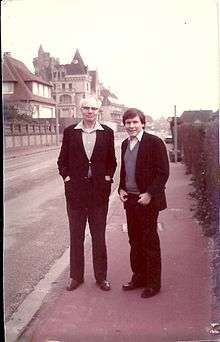
Martin then moved to Paris where he was responsible for energy statistics for developing countries at the International Energy Agency Organization for Economic Co-operation and Development and was part of a UN expert group that developed the methodology for reporting United Nations energy statistics. The statistics were published in the volumes I[5] and II[6] of the report Workshop on Energy Data of Developing Countries (IEA/OECD, 1978). Martin was also director of the IEA Workshop on Energy Statistics for Developing Countries that resulted in the first publication of energy statistics for over 100 countries in a matrix supply/demand integration format.
In 1978, he was promoted to Special Assistant to the Executive Director of the IEA, Ulf Lantzke, and served in this capacity for two years during the time of the Second Oil Shock. At the commencement of the Iran-Iraq war, it was agreed that nations should coordinate their oil stock draws in the event of a major disruption. As the Special Assistant to the IEA Executive Director, Martin served as the coordinator for four IEA Ministerial meetings where he aided in the drafting of several communiques, including the one from 1981[7] that is the basis of IEA agreements today on coordinated stock draw as well as a key element of the 2009 discussions between Henry Kissinger (the founder of IEA), Nobuo Tanaka (then Executive Director) and Martin on expanding this concept to include China, India and other advancing nations. A letter from Kissinger to Martin recognizing his contribution in this regard can be seen online.[8]

Reagan Administration
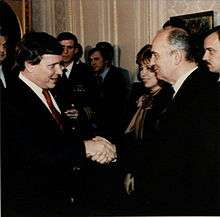
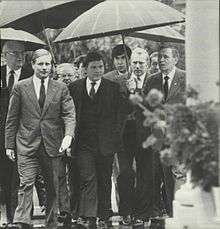
In 1981, Martin joined the United States Department of State as Special Assistant to Under Secretary of State James L. Buckley who recalled Martin's activities in his book Gleanings from an Unplanned Life.[9] The senior Reagan administration inter-agency "Buckley Group" that Martin coordinated sought to reduce European subsidies and credits to the Soviet Union. It also urged Europeans to reduce their dependence on Soviet gas and to find alternatives. Finally, it proposed market oriented energy policies for the United States (deregulation of oil and gas price controls, permitting Alaskan oil exports, allowing eminent domain for coal slurry pipelines) -- all policies of which eventually came to fruition during the Reagan Presidency. (see reference to this again in James Buckley's Gleanings from an Unplanned Life).[10] Martin briefed President Reagan in the Oval Office that unless the US was credible in its energy policies, the Europeans would not take seriously our concerns on their over dependence on Soviet gas imports.
In 1982, he was transferred to the National Security Council as the Director of International Economic Affairs. In this capacity he prepared recommendations for the President in the areas of energy security, East-West economic relations, the Iran-Iraq War and Central American economic development. A key responsibility of Martin's was to conceptualize and then negotiate with the Europeans on the issue of reducing their reliance on Soviet natural gas imports, a project that was directed personally by President Reagan. Martin made a key presentation to President Reagan on alternative gas scenarios for Europe, concluding that the Troll field was vital for European security.[11] Martin's role was to negotiate the development of the giant Norwegian Troll gas field to be an alternative to Soviet gas imports and this was documented in the book Troll: Gas for Generations, an excerpt of which can be seen online.[12] This was part of a larger program to undermine the Soviet economy as reported by Peter Schweizer in his book, Victory: The Reagan Administration's Secret Strategy that Hastened the Collapse of the Soviet Union and the excerpt where he credited Martin for this effort can be seen online.[13]
.jpg)
Martin is also credited in a Presidential citation as the principal draftsman of the Williamsburg Declaration, at the 9th G7 Summit[14] which is a three-page communique agreed to by the G-7 leaders who were Prime Minister Margaret Thatcher of the UK, Prime Minister Yasuhiro Nakasone of Japan, Chancellor Helmut Kohl of West Germany, Prime Minister Pierre Trudeau of Canada, Prime Minister Amintore Fanfani of Italy and Prime Minister François Mitterrand of France. The President read the three-page declaration before the world press (President Reagan's opening remarks can be seen on online).[15] and credited Martin as the principal draftsman in the following online letter.[16] Many conclude that this jointly agreed document, which argued for free markets and free trade policies, set in place the foundations for a worldwide economic recovery beginning in 1983. Based on these achievements, Martin was appointed Special Assistant to President Reagan, responsible for the coordination of the President's international and head of state meetings.
Martin helped arrange President Reagan's international meetings coordinating with the White House Advance Office, NSC staff and the Department of State. He participated in the President's visits to Japan (1983), South Korea (1983), China (1984), Ireland (1984), United Kingdom (1984), the D-Day fortieth anniversary commemoration on Normandy beaches in France (1984), Canada (1985), Spain (1985), Germany (1985), EU Parliament (1985), the Reagan-Gorbachev Geneva Summit (1985) and several G-7 economic summit meetings (Williamsburg, London and Bonn). Working closely with the State Department and NSC staff, he also coordinated the preparation of President Reagan's Oval Office head of state meetings. As NSC Senior Director for Coordination, he coordinated and participated in the President's major bilateral meetings with, among others, Prime Minister Yasuhiro Nakasone of Japan, Shimon Peres of Israel, King Fahd of Saudi Arabia, Prime Minister Brian Mulroney of Canada, President Ali Saibou of Niger, King Hussein of Jordan, Prime Minister Margaret Thatcher of the UK, Prime Minister Bettino Craxi of Italy, Prime Minister Kåre Willoch of Norway, Prime Minister Prem Tinsulanond of Thailand, Prime Minister Ranasinghe Premadasa of Sri Lanka, Foreign Minister Andrei Gromyko of the USSR, OECD Secretary General Jean-Claude Paye, UN Secretary General Javier Pérez de Cuéllar and Chancellor Helmut Kohl of West Germany.
In addition to general preparations for the President's meeting with the Soviet Premier Mikhail Gorbachev, he and Dr. Alvin Trivelpiece were responsible for concluding an agreement with his Russian counterpart Academic Evgeny Velikhov on magnetic fusion cooperation that has since become the ITER (International Thermonuclear Experimental Reactor)[17] project as recognized in the concluding sentence of the communique of this historic meeting, "The two leaders emphasized the potential importance of the work aimed at utilizing controlled thermonuclear fusion for peaceful purposes and, in this connection, advocated the widest practicable development of international cooperation in obtaining this source of energy, which is essentially inexhaustible, for the benefit for all mankind".[18] A letter from Martin to Dr. Trivelpiece recounting this experience can be seen online.[19]
In preparation the for major visits abroad and in the Oval office, as well visits outside the United States, Martin would sometimes do the first draft of the President's weekly radio address in close coordination with Presidential chief speech writer Ben Elliott. Three of these addresses were especially important. First, Reagan's radio address in 1984 following his first meeting with a Soviet leader (Foreign Minister Gromyko) after four years in office.[20] This widely quoted radio address, highlighted in headlines on the front page of the Washington Post[21] set the agenda and tone for the subsequent meeting with Soviet leader Gorbachev one year later. Reagan recognized Martin's role in its drafting in the following letter.[22] Second, Martin prepared a radio address describing the G-7 Economic Meeting chaired by Margaret Thatcher in 1984.[23] And third, he prepared a radio address in 1983 describing the President's visit to Japan and Korea.[24] In appreciation for Martin's work on numerous projects, President Reagan commended him in a series of letters on: European gas supplies;[25] the 1983 Williamsburg Summit;[26] the 1984 UN General Assembly;[22] the 1985 Reagan-Gorbachev Geneva Summit;[27] Reagan's 1983 trip to Asia;[28] Reagan's 1984 trip to China;[29] and Martin's tenure as the Executive Secretary of the National Security Council.[16]
National Security Council, the White House
Martin served as the Executive Secretary of the National Security Council in the Reagan White House.[30] The Executive Secretary is the head of the NSC as defined by the National Security Act of 1947. In practice, it serves as the NSC's chief of staff responsible for coordination, budget and management of the National Security Council. The Executive Secretary coordinates the National Security Council meetings and manages vital policy and information communication from the Cabinet and the NSC staff to the President. One of the duties of Mr. Martin as Executive Secretary was to oversee the White House Situation Room located in the basement of the West Wing of the White House which is in 24/7 communication with the Department of Defense, State Department, Intelligence Community and US embassies abroad.
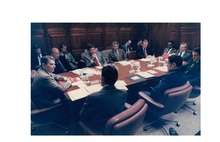
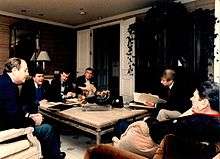
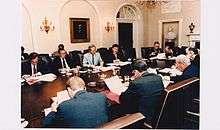

As Executive Secretary, Martin also chaired an Executive Secretary group composed of officials from State, Defense, CIA and the NSC responsible for coordinating the President's national security priorities as identified in a book titled National Security Issues of the United States.[31] Martin developed a system for briefing the President using a six-month national security intelligence, policy and implementation calendar working closely with his inter-agency colleagues Colin Powell and Robert Gates.
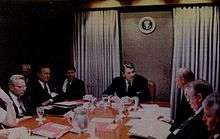
Martin also initiated and coordinated the production of several videos prepared for the President describing Reagan's international visits, objectives and "scene-setters" including his visit to China in 1984, his visit to Europe to celebrate the fortieth anniversary of D-Day and a preview of the historic first meeting with Soviet leader Gorbachev in Geneva in 1985, a script of which can be seen online.[32] These videos were presented to the President just before visits to supplement other written and oral presentations.
At the time of the Iran-Iraq war in 1984, Martin was responsible for the coordination of an NSC Special Situation Group headed by Vice-President Bush on building up the defensive capabilities of friendly Middle Eastern countries and developing a strategy to cope with potential oil market disruptions. The briefing to the President was the culmination of several meetings of the NSC working group, documents of which can be found here: Memo on Internal Paper on Persian Gulf;[33] Memo outlining talking points;[34] Memo to McFarlane on working group;[35] Memo to Clark updating the situation;[36] and cables between President Reagan and British Prime Minister Thatcher on the subject.[37] Martin's role was detailed by Robert C. McFarlane in his book Special Trust, an excerpt of which can be seen online.[38] The plan, approved by the President and Vice President, was an important step in building US military capability in the Gulf resulting in the successful defense of Kuwait and Saudi Arabia in the 1991 Gulf War. The plan also stimulated the buildup of the US Strategic Petroleum Reserve. Martin's now declassified presentation to the President can be seen online.[39]
In 1985, Martin chaired an NSC inter-agency group on Central American Economic Development. The conclusion of the working group, presented to and approved by the President, was threefold: encourage free market reforms; contribute $8 billion in economic assistance; and encourage continued security in the region. The actual Reagan National Security Study Directive (NSSD) describing these initiatives can be viewed on reagan.utexas.edu.[40] The policy also called upon all US Cabinet officers to assist Central America in its quest for economic development (i.e. agriculture, energy, commerce and transportation). The theme of the presentation was that security assistance in Central America would be enhanced through economic growth and prosperity. Without economic progress, the security situation would continue to unravel. In addition, Martin coordinated a special program transfer Los Alamos National Laboratory "hot dry rock" energy technology to Costa Rica. The program laboratory program grew to include laser technology developed in Department of Energy (DOE) labs to evaluate air quality in Mexico City.
During the Christmas holiday season in 1985, Mr. Martin was traveling with President Reagan to California as the NSC aide. During this time, there was a terrorist attack on the Rome and Vienna airports, resulting in the deaths of many innocent men, women and children. Martin set up an NSC crisis management center on the site of the Annenberg Estate where the President was staying and kept the President updated with morning, noon and evening meetings. The terrorist was Abu Nidal and the New York Times reported that Martin was handling the terrorist attack for the President. It was learned that Abu Nidal had backing from Libya and a key question for the President was the appropriate response. The President responded that since the attacks were in Rome and Vienna, authorities in those countries should bring the criminals to justice. "This is not a time to spread violence in the region", the President told Martin and also told him to tell Israel not to attack Syrian missiles in the Beqaa Valley. Three months later when Americans were killed in the La Belle Discotheque bombing in Berlin, President Reagan responded with an attack on Gaddafi's compound codenamed Operation El Dorado Canyon.
William Martin was also involved in the conceptualization and implementation of the National Program Office. The National Program was established to ensure continuity of the United States government in the even of a nuclear attack. This deterrence system was later adapted following the 9/11 attacks to protect the US government in the event of a hostile terrorist attack.
Department of Energy

In June 1986, Martin was nominated by President Reagan and confirmed by the United States Senate as United States Deputy Secretary of Energy, the number two official of the United States Department of Energy.[41] Martin reported to Secretary of Energy John S. Herrington. The DOE is responsible for the nation's nuclear weapons complex, scientific research and energy policy. At the time of his confirmation, the department had over 150,000 employees and contractors. Martin was awarded the department's highest award by Energy Secretary John S. Herrington for a report he produced, Energy Security: Report to the President of the United States.[42] It was the first comprehensive inter-agency, publicly available study on US energy security and concluded that energy imports would continue to rise and that US must strive for greater energy efficiency and development of clean coal technology, safe nuclear power, natural gas, solar and other renewable technologies, as well as to maintain incentives for environmentally sensitive domestic oil development. Martin testified before the United States Senate Energy and Natural Resources Committee on the study conclusions. His testimony can be seen online.[43] For this, he was commended by the Democratic Chairman of the United States House Committee on Energy and Commerce, John Dingell.[44] Martin was also the administration's top energy adviser on the Canada–United States Free Trade Agreement that opened up energy markets between the United States and Canada. He was commended for his work as a member of the negotiating team and core member of the Cabinet group that oversaw the negotiations with Canada.[45] Martin's testimony on behalf of the agreement before the US House of Representatives Committee on Foreign Affairs, Subcommittee on International Economic Policy, Trade and Western Hemisphere Affairs can be seen online.[46] The full text of theses Congressional hearings on the agreement is available online.[47]
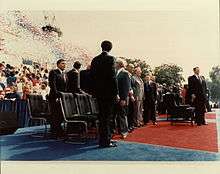
In 1986, Martin engaged then-Governor and future President Bill Clinton in a debate before the United States Senate Committee on Energy and Natural Resources on the merits of the Federal Energy Regulatory Commission's powers to set interstate electricity rates.[48] The Senate Committee supported Martin's view, objected to by Clinton, that an electricity holding company, Grand Gulf, could justifiably raise electricity prices in the state of Arkansas due to cost overruns of the Grand Gulf Nuclear Generating Station operating in Mississippi. Though Arkansas received no power from Grand Gulf because of their interstate jurisdictions under US federal law, this debate was significant in that it established firm guidelines for the US electricity industry during a period of deregulation and concern over "rate shock."

During Martin's tenure at the DOE, he was presented with and approved a proposal by Dr. Alvin Trivelpiece to map the Human Genome.[49] The Human Genome Project was the crown jewel of 20th century biology. This chart (available online)[50] was used in the Spring of 1986 by Trivelpiece, then Director of the Office of Energy Research in the Department of Energy, to brief Martin and Under Secretary Joseph Salgado regarding his intention to reprogram $4 million to initiate the project with the approval of Secretary Herrington. This reprogramming was followed by a line item budget of $16 million the following year. This modest effort triggered the activities that led to the sequencing of the Human Genome. It is notable that this scientific gem was launched by the math, physics and supercomputing strengths of the Department of Energy.[51] Trivelpiece and Martin, under the supervision of Secretary Herrington, also collaborated on a project to launch the Superconducting Super Collider. A letter from Martin to Dr. Trivelpiece recounting the origins of ITER, Human Genome and SSC can be seen online.[19]
In 1987, Acting Secretary of Energy Martin also joined President Reagan and members of his cabinet and the United States Supreme Court to celebrate the 200th anniversary of the ratification of the United States Constitution. President Reagan, accompanied by his Cabinet, spoke on the footsteps of the US Capitol addressing hundreds of thousands of Americans celebrating the event on the National Mall.
Martin has continued to work with the DOE on various projects since his tenure as Deputy Secretary. From 2002 to 2004, he served on the Secretary's Advisory Board (SEAB),[52] chairing the industry-government sub-committee and participated in the drafting of its 2003 report Critical Choices: Science, Energy and Security.[53] Since 2002, he has been Chairman of the Nuclear Energy Advisory Committee (NEAC)[54] and was a committee member of a SEAB group to review the Department of Science.[55] Recently, he served in an advisory capacity on the DOE's Strategic Technology Energy Plan (STEP) aimed to utilize technological gains in energy efficiency to both reduce carbon emissions as well as overall energy consumption. His contribution to the project was to create an energy supply/demand ‘matrix’ approach to detail all sectors of energy use (industrial, commercial, residential etc.) and supplies to meet those demands. A sample matrix can be seen online.[56]
Martin has testified more than twenty-five times before the US House of Representatives and US Senate on topics including: United States energy security; the US-Canada Free Trade Agreement; oil and gas tax policy; the future of natural gas; China's nuclear power prospects; US coal exports; electricity deregulation; the US-Japan Nuclear Cooperation Agreement; the priorities of the Department of Energy, the role of International Energy Agency; renewable energy prospects; the Strategic Petroleum Reserve; the Reagan-Gorbachev fusion agreement; and US economic sanctions policy. A full list and links to the individual testimonies can be found online.[57]
Republican Presidential Campaigns
Martin has been part of the campaign of every Republican Presidential candidate since 1988. He has also served as a spokesman/surrogate speaker for the Presidential candidate on matters related to energy and the environment.
1988: First George H.W. Bush Campaign: Martin served as policy coordinator for the George H.W. Bush Presidential Campaign producing "Issues 88", a compilation of the policies of the campaign[58] under the direction of Charles R. Black, Jr. and James Cicconi. His efforts were commended by George H.W. Bush in a letter that can be seen online.[59]
1992: Second George H.W. Bush Campaign: Martin served as the Executive Director of the Republican Platform Committee and co-authored the Committee's volume, The Vision Shared: Uniting Our Family, Our Country, Our World.[60] His responsibilities included managing hearings on topics of the Platform in Kansas City, Salt Lake City and Washington, D.C., culminating in the Platform discussions and presentation at the Republican National Convention in Houston.
1996: Robert Dole Campaign: Martin compiled an "Issues Book" for the campaign of Robert Dole building on the methodology and presentation of the 1988 Bush Issues Book.[61] He was also commended by Dole for his effort in the following letter.[62]
2000: George W. Bush Campaign Martin prepared a national security transition memo at the time of the election of George W. Bush outlining the first year's national security priorities.[63]
2008: John McCain Campaign Martin prepared a national security issues paper and calendar for the campaign of John McCain.[64]
Diplomatic Endeavors and honors
World Resources Institute: Martin joined the board of the World Resources Institute in 1998 and served as WRI's Chairman of the Development Committee. He was instrumental in conceptualizing the October 2000 "Digital Dividends" conference[65] between leading environmentalists and technology leaders, including Bill Gates, on reducing the digital divide.
Trilateral Commission: In 1997, he was the lead author of a Trilateral Commission study, Maintaining Energy Security in a Global Context.[66] His co-authors were Helga Stegg and the Japanese Ambassador to the United Nations Disarmament Conference, Ryukichi Imai. The report was translated into French, German and Japanese.[67]
Nuclear Energy Advisory Committee: Martin is a member of the Department of Energy's Nuclear Energy Advisory Committee[54] and served as Chairman from 2002 to 2012. Appointed under the Administration of George W. Bush in 2002, Martin oversaw the sixteen person committee responsible for advising the Department of Energy on four key areas: nuclear reactor research & development (including Gen-IV reactors); technology issues related to fuel cycle; infrastructure requirements for DOE national laboratories; and international nuclear issues (including non-proliferation, safety and security). In 2008, NEAC released the report, Nuclear Energy: Policies and Technology for the 21st Century,[68] to provide a bipartisan approach to nuclear energy and technology road map for advancing safe nuclear energy worldwide. In 2011, Martin and fellow NEAC member Burton Richter (Nobel Prize winner in Physics) teamed up to write International Issues in Nuclear Power,[69] which will be included in the upcoming Hoover Institution book, The Nuclear Enterprise. Martin has also chaired the NEAC subcommittee on international nuclear energy, and at the December 2013 full NEAC meeting, presented a report[70] that recommended strengthening the US nuclear enterprise.
Council on Foreign Relations: Martin was elected to the Council on Foreign Relations in 1983 and served as chairman of the Council's Energy Security Group[71] from 1997 to 2006. He is a frequent speaker on energy at the Council including recent speeches on the Fukushima disaster and the subsequent effects and energy implications for US-Japan relations[72] as well as presiding over a session with Senator Joseph Lieberman on the future of China's energy situation.[73] On the occasion of the 90th anniversary of the Council on Foreign Relations, Mr. Martin presented a paper entitled Energy: Looking back, Looking Forward 90 Years.[74]
University for Peace: In 2004, Martin was appointed by the Secretary General of the United Nations Kofi Annan to the Council of the University for Peace.[75] He was then elected President of the Council at its October 2006 meeting. Headquartered in Costa Rica, the United Nations-mandated University for Peace was established in December 1980 as a Treaty Organization by the UN General Assembly. As determined in the Charter of the University, the mission of the University for Peace is "to provide humanity with an international institution of higher education for peace with the aim of promoting among all human beings the spirit of understanding, tolerance and peaceful coexistence, to stimulate cooperation among peoples and to help lessen obstacles and threats to world peace and progress, in keeping with the noble aspirations proclaimed in the Charter of the United Nations".[76] Martin retired after eight years of service on the UPEACE Council and was commended by UN Secretary General Ban Ki-moon in a letter that can be seen online.[77]
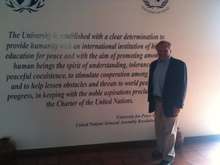
North Korea: Martin served as the chairman of the United Nations Working Group on the DPRK (North Korea), providing assistance to the Six Party Talks (involving representatives of the governments of China, Russia, Japan, United States, North and South Korea) on economic and energy prospects for the DPRK on behalf of the United Nations. This group issued the 2005 report, Energy Scenarios for the DPRK.[78] A companion group on economic issues confronting North Korea was chaired by Nobel Prize winner Joseph Stiglitz.
Prague Security Studies Institute:
In 1998, Martin co-founded the Robinson-Martin Security Scholars Program[79] at the Prague Security Studies Institute[80] that aims to educate Czech students in national security. In 2004 he co-chaired a conference in Prague on "Energy and Security" with former Czech Deputy Prime Minister Alexandr Vondra focused on developing diversified energy sources for the Czech Republic.[81] He is currently a member of the Board of PSSI and Chairman of the PSSI Corporate Council.[82] For these efforts, he was commended by President Václav Havel for outstanding contributions to the Czech Republic in the following letter.[83]
.jpg)
Club of Prague In 2004, he was co-founder of the Club of Prague,[84] an initiative under the auspices of President Václav Havel to seek more environmentally sensitive energy policies composed of distinguished scientists, historians, philosophers, writers and energy systems engineers. A report on a 2006 conference of the Club of Prague can be seen online.[85]
US-Japan relations: Long interested in US-Japan energy relations, Martin was Chairman of the US-Japan energy working group that produced the 1983 Reagan-Nakasone Joint Statement on Japan-United States Energy Cooperation.[86] He was also active in approving and testifying on the US-Japan Nuclear Cooperation Agreement of 1987 and was the lead witness of the Reagan Administration in support of the agreement before the United States Congress in December, 1987. His testimony can be seen online.[87] More recently, Martin has been coordinator of the Santa Fe Energy Seminar that brings senior Japanese and US government and private sector leaders together to discuss the importance of nuclear energy and its impact on the global environment, world economy and non-proliferation.[88] Martin has also made several speeches on the accident at Fukushima and its implications for Japan, the US and global energy.[89] On July 12, 2014, he appeared before a Japanese government advisory committee of the Ministry of Economics and Trade of Japan (METI) and gave testimony on "Nuclear Energy from a Global Perspective: The Significance of Japanese Nuclear Capacity for Energy Security and its Deployment in the Global Market."
International Atomic Energy Agency: In 2008, he was appointed by IAEA Director General Mohamed ElBaradei as Project Coordinator for the IAEA's 20/20 Project,[90] which provided an assessment of the challenges the Agency will face in a report, Reinforcing the Global Nuclear Order for Peace and Prosperity: The Role of the IAEA to 2020 and Beyond.[91]
Global Energy Prize: In 2008, William Martin was elected to the International Award Committee of the Global Energy Prize.[92] This prize, presented by the President of Russia, recognizes outstanding research and innovation in the field of energy. "The Global Energy International Prize is one of the most prestigious international awards granted for outstanding scientific achievements in the field of energy which have proved of benefit to the entire human race".[93]
Ministry of Foreign Affairs Leadership Award (France): In 1991, Martin was one of two recipients in the United States honoring American researchers interested in France. The award was granted by the Ministry of Foreign Affairs of France. The research, conducted in French, was focused on the French nuclear energy program.
Department of Defense: In early 2003, Martin was assigned to the Office of the Secretary of Defense with responsibilities to recruit senior US civilian advisers for assignments in Iraq. This involved placing American advisers in twenty six Iraqi agencies and ministries for the purposes of reconstruction, as well as dispatching Czech Chief Justice Vojtech Cepl to Iraq to evaluate property restitution. Based on this experience, Justice Cepl with the assistance of Ambassador Boyden Gray initiated the training of over one hundred and forty Iraqi judges in Prague's CEELI Institute.[94]
Business Activities and Family
Martin co-founded an international energy consulting firm, Washington Policy & Analysis Inc. with Scott L. Campbell in 1988[95] at the Washington law firm of Miller & Chevalier. WPA was later bought by the British company Lloyd's of London Press which later became part of Informa, UK.
Martin has two sons and was married to Jill Wheaton Martin from 1974 to 2008. In 2013, William Martin married Paule Audebert of Annecy, France. Nicholas Carl Martin (born August 10, 1982) is a graduate of Swarthmore College and the University for Peace and is President of TechChange,[96]w hich was recently spotlighted in The Economist[97] Christopher Flynn Martin (born February 6, 1984) is a graduate of the University of Pennsylvania (BA in Psychology) and Kyoto University (Doctorate of Science in Biology). Previously a researcher at the Primate Research Institute of Kyoto University[98] Dr. Christopher Martin[99] is now a postdoctoral researcher at the Indianapolis Zoo.[100]
Martin is from a pioneering Oklahoma political and oil family. His great-grandfather Dennis T. Flynn was the first US Delegate from Oklahoma Territory to the U.S. House of Representatives, and is the first inductee into the Oklahoma Hall of Fame.[101][102] His grandfather Olney Flynn was mayor of Tulsa and the Republican nominee for Governor of Oklahoma in 1948. One of Martin's ancestors was John Chisum, the Texas cattleman portrayed by John Wayne in the movie Chisum.
References
- ↑ http://www.wpainc.com/Archive/Articles/Harvard%20Business%20Review.pdf
- ↑ http://www.wpainc.com/Archive/MIT/Growth%20and%20Its%20Implications.pdf
- 1 2 http://www.wpainc.com/Archive/MIT/ENERGY%20%20Global%20Prospects%201985-2000.pdf
- ↑ http://www.wpainc.com/Archive/MIT/Energy%20and%20Economic%20Prospects%20for%20Developing%20Countries%201960-2000.pdf
- ↑ http://www.wpainc.com/Archive/IEA%20Files/IEA%201977%20to%201980/Workshop%20On%20Energy%20Data%20vol%201.pdf
- ↑ http://www.wpainc.com/Archive/IEA%20Files/IEA%201977%20to%201980/Workshop%20On%20Energy%20Data%20vol.%202.pdf
- ↑ http://www.wpainc.com/Archive/IEA%20Files/IEA%201977%20to%201980/IEA%201981%20Communique.pdf
- ↑ http://www.wpainc.com/Archive/IEA%20Files/IEA%202020%20Project/Letter%20to%20Martin%20from%20Henry%20Kissinger.pdf
- ↑ http://www.wpainc.com/Archive/Reagan%20Administration/Gleanings%20from%20an%20Unplanned%20Life.pdf
- ↑ http://www.wpainc.com/Archive/Reagan%20Administration/Gleanings%20from%20an%20Unplanned%20Life%202.pdf
- ↑ http://www.wpainc.com/Archive%5CReagan%20Administration%5CWFM%20Papers%20from%20Reagan%20Archives%5CIEA%20and%20Bilateral%20Energy%20Documents%5CMartin%20Memo%20to%20Clark%20on%20Soviet%20Gas%20in%20Europe%2010-22-82.pdf
- ↑ http://www.wpainc.com/Archive/Reagan%20Administration/Troll.pdf
- ↑ http://www.wpainc.com/Archive/Reagan%20Administration/William%20Martin%20reference%20in%20Peter%20Schweizer%27s%20book%20%27Victory%27.pdf
- ↑ "UTLink. G7 Economic Summit, Williamsburg, VA., 1983".
- ↑ "Ronald Reagan: Remarks on Reading the Williamsburg Economic Summit Conference Declaration on Economic Recovery".
- 1 2 http://www.wpainc.com/Archive/Reagan%20Administration/Letters%20from%20the%20Reagans/Letter%20from%20Ronald%20Reagan%206-9-86.pdf
- ↑ "ITER - the way to new energy".
- ↑ "Joint Soviet-United States Statement on the Summit Meeting in Geneva".
- 1 2 http://www.wpainc.com/Archive/DOE%20DepSec/WFM%20Letter%20to%20Dr.%20Alvin%20Trivelpiece%20on%20Achievements%20at%20DOE.pdf
- ↑ http://www.wpainc.com/Archive/Reagan%20Administration/Reagan%20Radio%20Addresses/Reagan%20Radio%20Address%20on%20Genever%20Summit%209-29-84.pdf
- ↑ http://www.wpainc.com/Archive/Reagan%20Administration/Reagan%20Operations/Washington%20Post%209-30-84.pdf
- 1 2 http://www.wpainc.com/Archive/Reagan%20Administration/Letters%20from%20the%20Reagans/Letter%20from%20Ronald%20Reagan%2010-18-84.pdf
- ↑ http://www.wpainc.com/Archive/Reagan%20Administration/Reagan%20Radio%20Addresses/Reagan%20Radio%20Address%20on%20G-7%20Meeting%206-9-84.pdf
- ↑ http://www.wpainc.com/Archive/Reagan%20Administration/Reagan%20Radio%20Addresses/Reagan%20Radio%20Address%20on%20South%20Korea%20Trip%2011-12-83.pdf
- ↑ http://www.wpainc.com/Archive/Reagan%20Administration/Letters%20from%20the%20Reagans/Letter%20from%20Ronald%20Reagan%205-24-83.pdf
- ↑ http://www.wpainc.com/Archive/Reagan%20Administration/Letters%20from%20the%20Reagans/Letter%20from%20Ronald%20Reagan%207-29-83.pdf
- ↑ http://www.wpainc.com/Archive/Reagan%20Administration/Letters%20from%20the%20Reagans/Letter%20from%20Ronald%20Reagan%2011-21-85.pdf
- ↑ http://www.wpainc.com/Archive/Reagan%20Administration/Letters%20from%20the%20Reagans/Letter%20from%20Ronald%20Reagan%2012-05-83.pdf
- ↑ http://www.wpainc.com/Archive/Reagan%20Administration/Letters%20from%20the%20Reagans/Letter%20from%20Ronald%20Reagan%207-16-84.pdf
- ↑ "National Security Council".
- ↑ http://www.wpainc.com/Archive/Reagan%20Administration/Selected%20National%20Security%20Issues%201985.pdf
- ↑ http://www.wpainc.com/Archive/Reagan%20Administration/WFM%20Papers%20from%20Reagan%20Archives/1984%20Trip%20to%20Europe/Film%20for%20President%20on%20Trip%20to%20Europe%201984.pdf
- ↑ http://www.wpainc.com/Archive/Reagan%20Administration/WFM%20Papers%20from%20Reagan%20Archives/Iran-Iraq/Bonk%20Memo%20to%20Martin%20on%20Persian%20Gulf%204-9-84.pdf
- ↑ http://www.wpainc.com/Archive/Reagan%20Administration/WFM%20Papers%20from%20Reagan%20Archives/Iran-Iraq/Revised%20Talking%20Points%20for%20NSC%20Meeting%20on%20Iran-Iraq%20Energy%203-20-84.pdf
- ↑ http://www.wpainc.com/Archive/Reagan%20Administration/WFM%20Papers%20from%20Reagan%20Archives/Iran-Iraq/Martin%20Memo%20to%20McFarlane%20on%20Iran-Iraq%20Working%20Groups%201-12-84.pdf
- ↑ http://www.wpainc.com/Archive/Reagan%20Administration/WFM%20Papers%20from%20Reagan%20Archives/Iran-Iraq/Martin%20Memo%20to%20Clark%20on%20Iran%20Iraq%205-7-84.pdf
- ↑ http://www.wpainc.com/Archive/Reagan%20Administration/WFM%20Papers%20from%20Reagan%20Archives/Cables%20Between%20Reagan%20and%20Thatcher%201984.pdf
- ↑ http://www.wpainc.com/Archive/Reagan%20Administration/Special%20Trust.pdf
- ↑ http://www.wpainc.com/Archive/Reagan%20Administration/WFM%20Papers%20from%20Reagan%20Archives/Iran-Iraq/Presentation%20on%20Gulf%20Oil%20Disruption%205-22-84.pdf
- ↑ http://www.reagan.utexas.edu/archives/reference/Scanned%20NSSDs/NSSD2-85.pdf
- ↑ "Nominations & Appointments, February 21, 1986".
- ↑ http://www.wpainc.com/Archive/DOE%20DepSec/Energy%20Security%20A%20report%20to%20the%20President.pdf
- ↑ http://www.wpainc.com/Archive/Congressional%20Testimony/Testimony%20as%20Deputy%20Secretary,%20DOE/5-20-87%20-%20Testimony%20on%20Energy%20Secrurity%20Report-%20Senate%20Energy%20and%20Natural%20Resources.pdf
- ↑ http://www.wpainc.com/Archive/DOE%20DepSec/Letter%20to%20WFM%20from%20Rep.%20John%20Dingell.pdf
- ↑ http://www.wpainc.com/Archive/Reagan%20Administration/WFM%20Free%20Trade%20Certificate.JPG
- ↑ http://www.wpainc.com/Archive/Reagan%20Administration/US-Canada%20Free%20Trade%20Agreement/William%20Martin%20Prepared%20Statement%20for%20US-Canada%20Free%20Trade%20Agreement%20Congressional%20Testimony.pdf
- ↑ http://www.wpainc.com/Archive/Reagan%20Administration/US-Canada%20Free%20Trade%20Agreement/Full%20Text%20of%20William%20Martin%20Congressional%20Hearing%20on%20US-Canada%20Free%20Trade%20Agreement.pdf
- ↑ http://www.wpainc.com/Archive/Congressional%20Testimony%20and%20Debates/Senate%20Testimony%20with%20William%20Clinton%201986.pdf
- ↑ "Report on the Human Genome Initiative for the Office of Health and Environmental Research". ornl.gov.
- ↑ http://www.wpainc.com/Archive/Trivelpiece/HGP%20Presenation.jpg
- ↑ http://www.krellinst.org/doecsgf/deixis/2004/genome_1.php
- ↑ "Secretary of Energy Advisory Board - Department of Energy".
- ↑ http://www.wpainc.com/Archive/NEAC/SEAB%202003%20Report.pdf
- 1 2 http://www.ne.doe.gov/neNeacOverview.html
- ↑ DOE Office of Science. http://science.energy.gov/
- ↑ http://www.wpainc.com/Archive/DOE%20Projects/STEP%20Matrix%20with%20Supply%20and%20Demand%20Integration.pdf
- ↑ http://www.wpainc.com/Archive/Congressional%20Testimony/William%20Martin%20Congressional%20Testimony%20Master%20List.pdf
- ↑ http://www.wpainc.com/Archive/Presidential%20Campaigns/George%20H.W.%20Bush/Issues%20%2788.pdf
- ↑ http://www.wpainc.com/Archive/Presidential%20Campaigns/George%20H.W.%20Bush/Letter%20from%20George%20H%20W%20Bush.JPG
- ↑ http://www.wpainc.com/Archive/Presidential%20Campaigns/George%20H.W.%20Bush/The%20Vision%20Shared.pdf
- ↑ http://www.wpainc.com/Archive/Presidential%20Campaigns/Bob%20Dole/Bob%20Dole%20Campaign%20Issues%20Book%201996.pdf
- ↑ http://www.wpainc.com/Archive/Presidential%20Campaigns/Bob%20Dole/Letter%20to%20WFM%20from%20Senator%20Bob%20Dole.pdf
- ↑ http://www.wpainc.com/Archive/Presidential%20Campaigns/George%20W.%20Bush/National%20Security%20Transition%20Memo.pdf
- ↑ http://www.wpainc.com/Archive/Presidential%20Campaigns/John%20McCain/McCain%202008%20Presidential%20Campaign%20Booklet.pdf
- ↑ Digital Dividends World Resources Institute. October 16–18, 2000.
- ↑ http://www.wpainc.com/Archive/Council%20on%20Foreign%20Relations/Maintaining%20Energy%20Security.pdf
- ↑ http://www.wpainc.com/Archive/Council%20on%20Foreign%20Relations/Maintaining%20Energy%20Security%20%28Japanese%20Version%29.pdf
- ↑ http://www.ne.doe.gov/neac/neacPDFs/NEAC_Final_Report_Web%20Version.pdf
- ↑ http://www.wpainc.com/Archive/Japan%20and%20the%20Santa%20Fe%20Seminar/WFM%20Post-Fukushima%20Nuclear%20Speeches/International%20Issues%20-%20Hoover%20Nuclear%20Forum%20-%2010-3-11.pdf
- ↑ http://www.wpainc.com/Archive/NEAC/NEAC%20International%20Subcommittee%20Recomendations%20List%20for%20NE%20and%20NE6.pdf
- ↑ "Energy Security Group".
- ↑ http://www.wpainc.com/Archive/Council%20on%20Foreign%20Relations/WFM%20Post-Tohoku%20Earthquake%20Speech%20at%20CFR.pdf
- ↑ "China-U.S. Energy Policies: A Choice of Cooperation or Collision".
- ↑ http://www.wpainc.com/Archive/Council%20on%20Foreign%20Relations/WFM%20Council%20on%20Foreign%20Relations%20Speech%206-8-11%20(2).pdf
- ↑ "University for Peace".
- ↑ "About UPEACE".
- ↑ http://www.wpainc.com/Archive/UPEACE/Letter%20to%20WFM%20from%20UN%20DG%20Ban%20Ki%20Moon.pdf
- ↑ "University for Peace" (PDF).
- ↑ "PSSI - Security Scholars Program".
- ↑ "PSSI - THE PRAGUE SECURITY STUDIES INSTITUTE".
- ↑ "PSSI - THE PRAGUE SECURITY STUDIES INSTITUTE" (PDF).
- ↑ "PSSI - THE PRAGUE SECURITY STUDIES INSTITUTE".
- ↑ http://www.wpainc.com/Archive/PSSI/Letter%20from%20Czech%20President%20Vaclav%20Havel.jpg
- ↑ "PSSI - THE PRAGUE SECURITY STUDIES INSTITUTE".
- ↑ http://www.wpainc.com/Archive/PSSI/The%20Club%20of%20Prague%20Conf.%20Report.pdf
- ↑ "Joint Statement on Japan-United States Energy Cooperation".
- ↑ http://www.wpainc.com/Archive/Japan%20and%20the%20Santa%20Fe%20Seminar/WFM%20Congressional%20Testimony%20on%20US-Japan%20Nuclear%20Cooperation%20Agreement%201987-88.pdf
- ↑ "WPAInc.com".
- ↑ http://www.wpainc.com/Archive%5CJapan%20and%20the%20Santa%20Fe%20Seminar%5CWFM%20Post-Fukushima%20Nuclear%20Speeches%5CWilliam%20Martin%20Major%20Post-Fukushima%20Speeches.pdf
- ↑ http://www.wpainc.com/Archive/IAEA%20Project/Letter%20from%20IAEA%20DG%20ElBaradei.pdf
- ↑ http://www.iaea.org/NewsCenter/News/PDF/2020report0508.pdf
- ↑ http://www.globalenergyprize.org/en/menu/11/text
- ↑ http://www.globalenergyprize.org/en/menu/12/text
- ↑ http://www.ceeliinstitute.org/history-of-the-ceeli-institute.aspx
- ↑ "Home Page".
- ↑ "TechChange - Home".
- ↑ "Geeks for good". 27 June 2012 – via The Economist.
- ↑ "Primate Research Institute, Kyoto University".
- ↑ http://www.cicasp.pri.kyoto-u.ac.jp/people/christopher-martin
- ↑ "Indianapolis Zoo Plan Your Visit". indianapoliszoo.com.
- ↑ "Oklahoma Hall of Fame".
- ↑ Oklahoma Heritage Association. Oklahoma Hall of Fame
External links
| Wikimedia Commons has media related to William Flynn Martin (economist). |